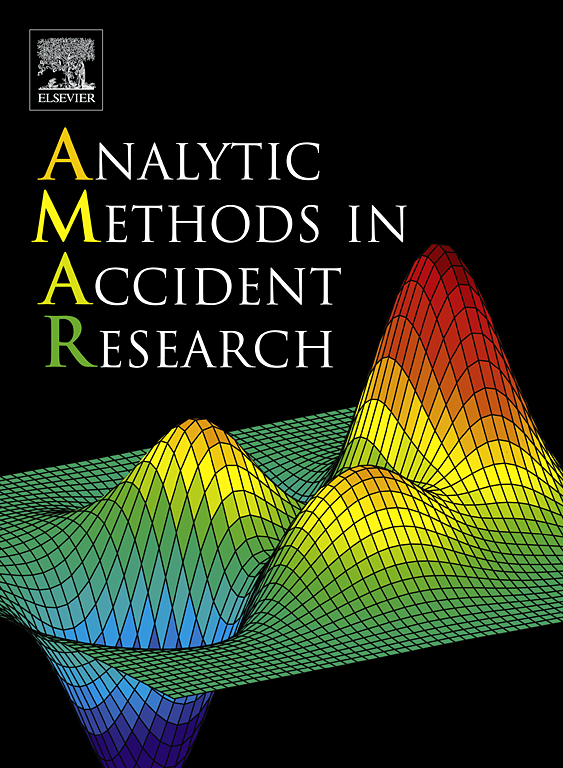基于短期冲突的崩溃风险预测:贝叶斯条件峰值超过阈值方法
IF 12.6
1区 工程技术
Q1 PUBLIC, ENVIRONMENTAL & OCCUPATIONAL HEALTH
引用次数: 0
摘要
预测短期碰撞风险对于实时道路安全管理至关重要,但这一研究领域仍未得到充分探索。经典的极值理论(EVT)模型假设独立的观测值,限制了其捕捉极端交通冲突发生时间和规模的聚类行为的能力。为了克服这一限制,我们引入了包含时变参数的条件峰值超过阈值(POT)模型,以同时捕获极端交通冲突的动态并实现对碰撞风险的预测。在标记点过程(MPP)和EVT的框架内,通过贝叶斯推理建立了基于两种观测驱动方法(自激励和分数驱动)的条件POT模型。采用动态风险度量VaR (Value-at-Risk)来评估这些条件POT模型在预测崩溃风险方面的性能。对某信号交叉口连续两天的追尾冲突数据进行实证分析,结果表明自激模型和分数驱动的POT模型均能有效表征极端交通冲突的聚类行为。此外,回溯测试证实,条件POT模型比经典POT模型提供了更准确的碰撞风险预测,经典POT模型往往低估了极端交通冲突中的碰撞风险,忽略了时间依赖性。在研究的模型规范中,分数驱动的POT模型显示出优越的预测性能。我们提出的贝叶斯条件POT方法提供了概率预测,实现了直接的不确定性量化和碰撞风险的动态监测,从而支持明智的安全决策。本文章由计算机程序翻译,如有差异,请以英文原文为准。
Short-term conflict-based crash risk forecasting: A Bayesian conditional peak-over-threshold approach
Forecasting short-term crash risks is crucial for real-time road safety management, yet this research area remains largely underexplored. Classical Extreme Value Theory (EVT) models assume independent observations, limiting their ability to capture the clustering behavior in occurrence times and magnitudes of extreme traffic conflicts. To overcome this limitation, we introduce conditional peak-over-threshold (POT) models that incorporate time-varying parameters to simultaneously capture the dynamics of extreme traffic conflicts and enable forecasting for crash risk. Within the framework of marked point process (MPP) and EVT, we develop the conditional POT models based on two observation-driven approaches (self-exciting and score-driven) through Bayesian inference. A dynamic risk measure, Value-at-Risk (VaR), is employed to assess the performance of these conditional POT models for crash risk forecasting. Empirical analysis of rear-end conflict data collected from a signalized intersection across two separate days demonstrates that both self-exciting and score-driven POT models effectively characterize the clustering behavior of extreme traffic conflicts. Furthermore, backtesting confirms that conditional POT models provide more accurate crash risk forecasts than classical POT models, which tend to underestimate crash risk by ignoring temporal dependence in extreme traffic conflicts. Among the examined model specifications, score-driven POT models demonstrate superior forecasting performance. Our proposed Bayesian conditional POT approach provides probabilistic forecasting that enables direct uncertainty quantification and dynamic monitoring of crash risk, thereby supporting informed safety decisions.
求助全文
通过发布文献求助,成功后即可免费获取论文全文。
去求助
来源期刊

Analytic Methods in Accident Research
Multiple-
CiteScore
22.10
自引率
34.10%
发文量
35
审稿时长
24 days
期刊介绍:
Analytic Methods in Accident Research is a journal that publishes articles related to the development and application of advanced statistical and econometric methods in studying vehicle crashes and other accidents. The journal aims to demonstrate how these innovative approaches can provide new insights into the factors influencing the occurrence and severity of accidents, thereby offering guidance for implementing appropriate preventive measures. While the journal primarily focuses on the analytic approach, it also accepts articles covering various aspects of transportation safety (such as road, pedestrian, air, rail, and water safety), construction safety, and other areas where human behavior, machine failures, or system failures lead to property damage or bodily harm.
 求助内容:
求助内容: 应助结果提醒方式:
应助结果提醒方式:


